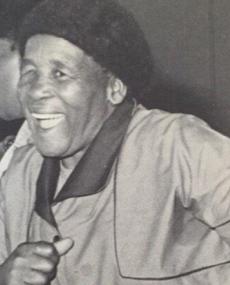
Political prisoner, banned person, member of the ANC, ANCWL, FEDSAW, UWCO and SANSCO, Vice Chairperson of UWO and recipient of The Order of Luthuli in Silver
Dorothy Nomazotsho Zihlangu was born in 1920 at Dyamala Village in Alice in the Eastern province (now Eastern Cape). She received her Standard Six primary education at Ncerha Primary School in Alice.
In 1939, she went to Cape Town to improve her educational qualifications. However, financial constraints prevented her from doing so. She then found a job as a domestic worker in Green Point. In 1941, she was forcibly relocated from the Cape Town city centre to Langa Township under the Group Areas Act where she joined the African National Congress (ANC) and later the African National Congress Womens League (ANCWL).
Zihlangu took part in the ANC’s Defiance Campaign in 1952. This Campaign, a crucially important political factor in the period prior to the banning of the (ANC) and other political organisations in 1960, led to the formation of the Federation of South African Women (FEDSAW) in 1954.
Between 1954 and 1955, she was among the local organisers and volunteers who were actively involved in the Freedom Charter Campaign, which ultimately led to the adoption of the Freedom Charter in Kliptown near Johannesburg on 25 June 1955.
In 1956, she participated in the historic Women's March to the Union Buildings in Pretoria to protest the draconian pass laws which were extended to women. In 1960, Zihlangu participated in the one-day 'stay-at-home' protest, during which people had to surrender their dompasses at their nearest police stations. In April 1960, she was, along with many other women activists, arrested and detained for six months under the State of Emergency regulations. At that time, she was pregnant and immediately after her release, she gave birth to a son, Melisizwe. She was banned and placed under house arrest with her husband.
Zihlangu was actively involved in the founding of the United Women's Organisation (UWO), of which she became Vice-Chairperson in 1985, the South African National Civic Organisation (SANSCO) and the United Women's Congress (UWCO).
At the beginning of the State of Emergency in the mid-1980s, Zihlangu went into hiding, but continued to work underground for the ANC. However, the police later arrested her. In 1988, she was part of the group of persons who decided to defy their banning orders. This forced the State to lift the banning orders but other restrictions were imposed on them.
In 2005, the South African Government conferred The Order of Luthuli in Silver to Dorothy Nomazotsho Zihlangu for her contribution to the struggle for gender equality and her selfless contribution to the struggle for a free and democratic South Africa.
Dorothy Nomazotsho Zihlangu passed away in 1991.